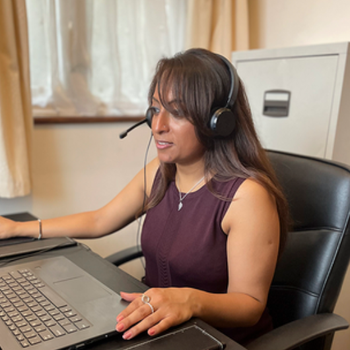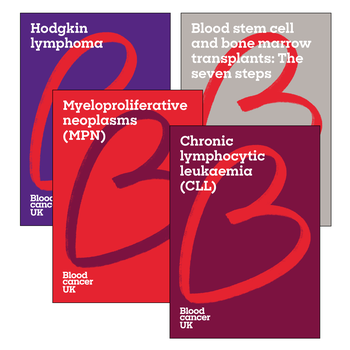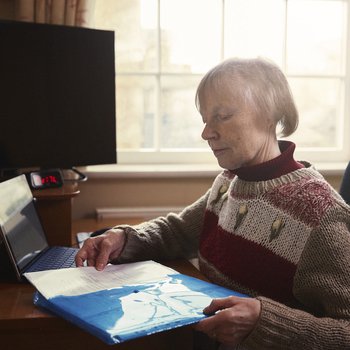Leukaemia
Leukaemia (also known as leukemia) is a type of blood cancer that affects blood cells in your bone marrow – usually white blood cells.
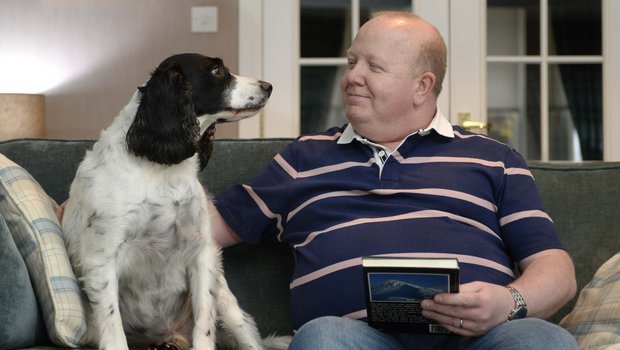
What is leukaemia (leukemia)?
Leukaemia is a type of blood cancer that affects blood cells in your bone marrow – usually white blood cells.
Your bone marrow is a spongy tissue found inside some of your bones, and it’s where the body makes blood cells. In leukemia, blood cells are not produced the way they should be and you may have too many, too few, or blood cells that don't work properly.
There are different types of leukaemia depending on the type of blood cell affected and how the condition develops. Some types are slow-growing (chronic) and some are fast-growing (acute). We have more detailed information on different types of leukaemia:
- Acute lymphoblastic leukaemia (ALL)
- Acute myeloid leukaemia (AML)
- Acute promyelocytic leukaemia (APL)
- Chronic lymphocytic leukaemia (CLL)
- Chronic myeloid leukaemia (CML)
- Childhood leukaemia
- Hairy cell leukaemia
- Large granular lymphocytic leukaemia (LGLL)
If you’re in your teens or twenties, find out how other young people have coped with a leukaemia diagnosis.
Just diagnosed with leukaemia
If you've just been told you have leukaemia, sign up to our weekly support email for people recently diagnosed.
It gives you clear and simple information, practical tips and advice from others with blood cancer, to help during the first few weeks and months after diagnosis.
Information for family and friends
If someone you love has been diagnosed with leukaemia, you might find our information for family and friends helpful. It covers how to support someone with blood cancer, practical tips, coping with your own emotions, and real stories from other friends and family members.
You may also want to try our podcast for family and friends, Blood Cancer Heart to Heart, featuring honest conversations between people who know what it's like to have a loved one diagnosed with blood cancer.
Symptoms of leukaemia
Leukaemia symptoms vary depending on the type of leukaemia.
Some of the more common symptoms of leukaemia are:
- tiredness that lasts a long time and doesn’t improve with rest (fatigue)
- bruising and bleeding more easily
- repeated infections and high temperatures (fever)
- unexplained weight loss
- swollen lymph nodes (glands in your neck, armpit and groin).
We have more detailed information about leukaemia symptoms in general, and for specific types of leukaemia. You can choose a type at the top of this page.
Tests to diagnose leukaemia
You can read specific information about tests if you choose a type of leukaemia at the top of this page.
However, there are several common tests for leukaemia, including scans, bone marrow biopsies and immunophenotyping.
Read about tests to diagnose leukaemia.
Treatment for leukaemia
The treatment you have will depend on the type of leukaemia you have, as well as other factors.
We have more specific information about treatment if you choose a type of leukaemia above.
These are some common treatments. You might have these treatments on their own or in combination:
Active monitoring (watch and wait): Some people with slow-developing blood cancers don’t need treatment straight away – this is called active monitoring or watch and wait. You’ll be carefully monitored, and will only start treatment if and when it’s needed. Active monitoring doesn’t mean that you can’t be treated. It’s offered when your doctor believes there’s no added benefit to starting treatment straight away.
Chemotherapy: Chemotherapy uses drugs to kill cancer cells or stop them from growing. You can have chemotherapy through a drip into a vein, as a tablet you swallow or by injection under the skin. Some people with leukaemia will need to have high doses or high-intensity chemotherapy, which can cause more side effects. Lower dose or low intensity chemotherapy is usually gentler and causes fewer side effects.
Other drug therapies: There are other drug therapies that can be used on their own or with chemotherapy. Targeted therapies are drugs that work by targeting proteins or genetic changes that cancer cells have, which normal cells don’t have. They are also sometimes called biological therapies or immunotherapy. Examples used for leukaemia are drugs called rituximab and tyrosine kinase inhibitors (TKIs), but there are others.
Stem cell transplant: Blood stem cells are blood cells at their earliest stage of development. Having a stem cell transplant involves having high doses of chemotherapy to kill the abnormal cells in your bone marrow or lymph nodes, and then receiving new blood stem cells (either your own or from a donor) through a drip. The aim is for these new stem cells to start producing healthy blood cells.
Side effects of leukaemia treatment
There are a number of possible side effects of leukaemia treatment.
Some side effects are short-term and go away after treatment has finished, but others can last longer.
Read about the side effects of leukaemia treatment.
Prognosis for leukaemia
Some people will want to know how leukaemia will affect their future – this is known as your prognosis or outlook.
Your prognosis is individual to you and depends the type of leukaemia you have, what treatments you can have, and other things like your general fitness.
Ask your healthcare team about your prognosis if you want to know, because everyone is different. Your healthcare team know you and your individual situation.
Remember, your prognosis can also change over time, for example if you respond well to a treatment. Read our general information about things that might affect your prognosis.
You might find it difficult understanding or thinking about prognosis. Our Support Services Team is here to talk you through it, offer support, or simply listen.
Under 25?
Read our information on childhood leukaemia to find out more about treatments in children in young adults under 25.
We also have information on how to cope with a blood cancer diagnosis for teenagers and young adults aged 16 to 25.
Leukaemia research and clinical trials
Clinical trials are how we find new treatments and improve current ones. We can help you find out about clinical trials for leukaemia. Even if you just want to know a bit more about leukaemia research, try our Clinical Trials Support Service.
We've funded many breakthrough discoveries in leukaemia carried out by leading researchers over the past 60 years. Learn more about our research impact on leukaemia.
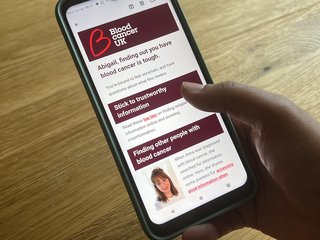
Get a weekly support email from us
We'll send you clear and simple information, practical tips, and advice from other people with blood cancer, to help during the first few weeks and months after diagnosis.

